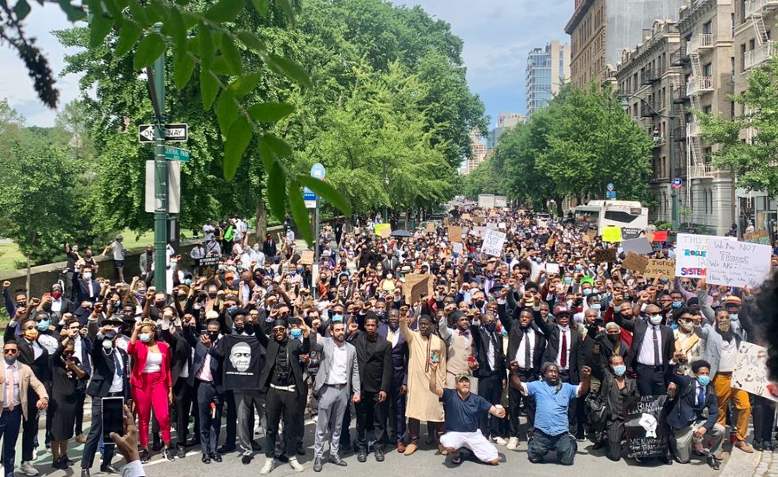 Harlem protest reaches Central Park, 4th June 2020. Photo: Keith Boykin via Twitter
Harlem protest reaches Central Park, 4th June 2020. Photo: Keith Boykin via Twitter
The brave defiance of the protesters in America has the ruling class in retreat, argues Chris Nineham
After decades of struggle against the horrific racism of the US justice system, the movement is breaking through. Suddenly, there are signs of ruling class disarray and retreat. First, Minnesota Attorney General Keith Ellison increased charges against Derek Chauvin to 2nd degree murder and charged the other 3 officers involved in the killing of George Floyd. These were central demands of the movement. Then Defense Secretary Mark Esper was forced to break ranks with Trump and oppose the use of the military on US streets. This was after Trumps’ previous Defense Secretary and former chief of Central Command James Matthis opposed the deployment of troops and issued a stunning rebuke of Donald Trump’s presidency in general. Later Barack Obama came out in support of the protests, even saying this is how change happens. At the same time CEOs of a number of big corporations have issued statements sympathising with the movement.
All this is first and foremost a testimony to the incredible mobilisations that began the day of George Floyd’s killing in Minneapolis and spread like wildfire around the country. From the start they were big, angry, mainly young and very mixed. Crucially, protestors refused to be intimidated by police repression. They defied curfews, shootings, rubber bullets, pepper spray and baton attacks and just kept on coming back. This defiance has been magnetic. Wednesday night saw some of the biggest protests and by that stage local police forces and national guards appear to have taken the decision that frontal assaults were becoming counter productive.
Equally important was the massive support and practical solidarity that emerged very rapidly particularly amongst working people. Early on bus workers in Minneapolis and New York refused to transport police officers, health workers have come out of hospitals to applaud the demonstrators, teachers unions have issued statements in support of the movement and staff at Facebook took virtual strike action in protest at Mark Zuckerberg’s refusal to take down Trump’s disgusting ’when the looting starts the shooting starts’ remark.
Given the dynamism of the protests and this level of support it quickly became clear to at least some key players in the US elite that Trump-style confrontation could detonate a social explosion. In this way the movement has cracked open existing divisions amongst the elites. Especially in the middle of the Coronavirus shambles, Trump’s provocative behaviour was becoming a liability. His rubber bullet and teargas-enabled trip to St John’s Lafayette Church was a public relations disaster. Quoting segregationists from the 1960s was an embarrassment to a ruling class trying to argue that racism was a matter of bad apples and no longer institutional. Senior establishment figures including senior generals who have long worried where Trump was headed are now speaking out. Hence the statement from James Matthis, a former hawkish general nicknamed ‘mad dog’. And hence the support from corporate HQs.
At a time of widespread anger on so many fronts, in a country where there has been growing signs of working class resistance, this is a chance to push forward for real change. Activists on the ground are welcoming a partial victory but pointing to big fights ahead. The dangers of police or national guard attack or of counter offensives from the extreme right remain real. It is also going to be important to resist siren voices from the Democratic Party leadership and beyond counselling self restraint and a focus on the upcoming elections.
This movement has done more to damage Donald Trump in ten nights than the Democratic leaders have managed in the three and a half years Trump has been in office. Democratic governors and mayors were among the first to respond to the protests with draconian police measures. The Democrats have long been partners at every level of government in constructing the prison-industrial complex and ‘tough-on-crime’ policing tactics that have fostered the police brutality and mass incarceration of black people.
Everyone knows this is about much more than getting rid of Trump, however welcome that would be. Racism and inequality are structural in the US as they are here. New demands are already emerging including fair trials and convictions of all the officers involved, justice for other recent victims of police and white supremacist killings —Breanna Taylor, Ahmaud Arbery, David Mctee and so many others – new laws to control policing and much more.
That it took a national uprising of protest just to get the four cops arrested and charged shows how deeply entrenched racism is in policing. It is so because racism is central to dividing people and preserving one of the highest levels of class inequality in the world. But by confronting racism so courageously and breaking down racial barriers this protest movement has opened up the possibility of change for working people across the US.

